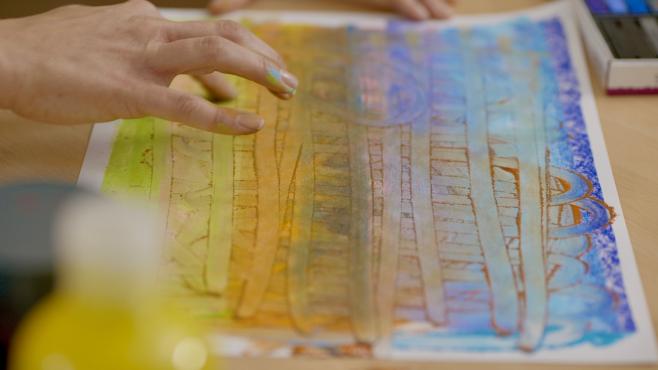You are here
Examples of placement innovations
Speech and Language therapy - Opportunities to provide intensive support to adults receiving care and treatment in psychiatric wards
Increasing the speech and language therapy placement offer has allowed patients to access more intensive assessment and interventions. Working with our local HEI we have been able to provide students with experience of working with one patient on a 1:1 basis for a period of 12 weeks. This provides the student with the opportunity to work with a patient through an episode of care; from case history and assessment through to goal setting and implementing interventions; all whilst having dedicated time to explore the wider evidence base, consider emerging interventions and produce a written report at the end of their placement. As a growing workforce within a mental health setting, this provides patients with an opportunity to receive intensive speech and language therapy input and ensure all aspects of their care are accessible to them, whilst also demonstrating the impact to service managers and commissioners.
Amy Hird, Clinical lead, Inpatient mental health speech and language therapy, Cumbria, Northumberland, Tyne and Wear NHS Foundation Trust.
Expanding the Arts Therapies - Dramatherapy in a forensic unit for women
We have an established art psychotherapy service within this service and recognised a need to expand the models of arts psychotherapies on offer to the women in the service, especially to those who have experienced historical trauma. It is often difficult for our service users to verbalise these experiences, as a result the trauma memories held within the body. Offering a dramatherapy intervention allowed a different opportunity for service users to explore and express their difficulties, in addition to solely talking therapies and art psychotherapy already available in the service. Having a student on placement allowed us to try out different approaches and expand the range of therapies we offer. The placement allowed time for the student to undertake research, scoping and develop a proposal for how best to deliver an intervention. This also included developing referral pathways, creating information leaflets for the service users and delivering an education workshop for staff. The student benefitted from gaining experience of working with high levels of mental distress and trauma, whilst working within a supportive team environment. This is valuable knowledge and experience that they will take with them into their future careers.
Francesca Norouzi, Consultant Art Psychotherapist and Head of Arts Psychotherapies, Birmingham and Solihull Mental Health Foundation Trust

Dietetics, learning disabilities and creative approaches
I was given the opportunity to undertake a role emerging placement in a residential setting for people with learning disabilities during my dietetics degree. Challenges presented in engaging residents in interventions and providing accessible information to support better food choices and reduce the prevalence of diet and weight-related comorbidities. One project focused on reducing purchases of high fat, high sugar snacks at the local shop. Residents were involved in the planning and implementation of the service improvement project via the design of posters and a ‘healthy eating’ logo. This approach enabled us to explore perceptions of, and provide education on, a healthy balanced diet using creative methods. The icon developed by the residents was displayed on ‘healthier choice’ products around the shop, making these easier to identify. Residents were proud of their involvement, and it was a very rewarding project for me. The placement increased my awareness of the health inequalities experienced by people with learning disabilities, and the difficulties that may present in supporting them to improve their diet. I am motivated to work to minimise these inequalities throughout my career as a dietitian and encourage the need to better embed good nutritional practices and care for people with learning disabilities.
Rachel Howarth, Dietetics Student, Teesside University.
Occupational therapy, autism awareness and football
During my Occupational Therapy degree, I completed a placement with a football stadium to help them become more inclusive of people with autism. I explored the sensory elements of attending a football match and identified where it might be overwhelming for supporters with autism. I traveled to other stadiums with autism-friendly initiatives and used this research to inform my intervention – developing a sensory space for supporters. This involved writing an evidence-based report which I presented to the stadium management outlining my proposal for a sensory space. This placement helped me to develop skills in research, my understanding of autism, clinical reasoning and presentation skills. Following the establishment of the sensory space, I was invited to speak at a conference on sensory integration and motivated me to promote inclusivity and awareness of autism in my professional role as an Occupational Therapist with adults with learning disabilities.
Lois Connelly, Occupational Therapist
Physiotherapy placements in new settings: the power of students
The conundrum: inpatient mental health services without dedicated physiotherapy provision, a desire to increase awareness of physiotherapy and a need for developing new physiotherapy placements.
The solution: a partnership with our local university to develop Role-Emergent Physiotherapy Student Placements. Working in buddy pairs, two students at a time undertook placements on a dementia assessment unit supported by university staff for professional supervision and the ward manager for clinical support. As part of the placement the students undertook a review of the physiotherapy process and alongside the university, the ward team and a physiotherapy lead in a partner organisation developed criteria, assessment processes and interventions to enhance patient care.
The results: These placements highlighted the role and value of physiotherapy to ward staff and senior leadership team and increased knowledge of mental health as a potential career route for physiotherapy students. Most importantly, the service users experience was greatly enhanced, mobility increased, and discharge accelerated. Other staff benefitted from access to a different ‘lens’ with which to view the needs of the patient.
Sarah Smith, Senior Lecturer and Physiotherapy Placement Lead; University of Cumbria; Janet Folland, Associate Director for Allied Health Professions and Professional Lead for Occupational Therapy (North Cumbria Locality); Cumbria, Northumberland, Tyne and Wear NHS Foundation Trust